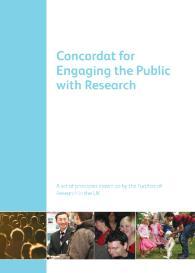Concordat for Engaging the Public with Research
 Public Engagement in Research
Public Engagement in Research
UKRI supports researchers to engage with the public, achieving a culture change so that public engagement is embedded alongside research and valued as an important activity. As such, the research councils are signatories of the Concordat for Engaging the Public with Research (PDF, 579KB), which outlines the expectations and responsibilities of research funders with respect to public engagement, to help embed public engagement in universities and research institutes.
By setting out clear expectations for research organisations, researcher managers and supporters and researchers themselves, the Concordat aims to strengthen existing good practice in public engagement by ensuring it is valued, recognised and supported.
Principles of the Concordat for Engaging the Public with Research
The Concordat consists of a set of key principles for the future support of public engagement, and under each principle, an explanation of how it may be embedded into institutional practice.
The Concordat's key principles:
- UK research organisations have a strategic commitment to public engagement
- Researchers are recognised and valued for their involvement with public engagement activities
- Researchers are enabled to participate in public engagement activities through appropriate training, support and opportunities
- The signatories and supporters of this Concordat will undertake regular reviews of their and the wider research sector’s progress in fostering public engagement across the UK
The aim of the Concordat is to inspire Universities to embed support for activities which foster public engagement with their research in their strategies and to encourage researchers to commit fully to public engagement activities as part of their professional development.
This Concordat complements the Concordat to Support the Career Development of Researchers. It does this through ensuring that public engagement is recognised and valued by the sector; that researchers are equipped and supported to undertake public engagement; and that they share responsibility for developing the skills required for their own personal and career development and lifelong learning.
Embedding Public Engagement
As part of the investment towards embedding, research councils have partnered with the Wellcome Trust and other UKRI partners and UK funding bodies to fund the National Coordinating Centre for Public Engagement (NCCPE).
The NCCPE defines public engagement as follows:
‘Public engagement describes the many ways in which higher education institutions and their staff and students can connect and share their work with the public. Done well, it generates mutual benefit, with all parties learning from each other through sharing knowledge, expertise and skills. In the process, it can build trust, understanding and collaboration, and increase the sector's relevance to, and impact on, civil society’.
 Public engagement in research activity includes:
Public engagement in research activity includes:
- Lectures and talks to non-academic audiences
- Fairs
- Podcasts aimed at non-academic audiences
- Articles in non-academic media
- Engaging the public as researchers
- Involvement in communities of practice
The University recommends that Principal Investigators on research grants to visit the NCCPE website for useful hints and tips when planning their project impact strategy.
Useful Links
- UoW Pathways to Impact Guidance
- UKRI Resources and funding for schools activities and smaller initiatives
- UKRI Listening to the Public
- UKRI Engagement Guides, policies, research and publications


/prod01/wlvacuk/media/departments/digital-content-and-communications/images-2024/240328-Varsity-Line-Up-Resized.jpg)
/prod01/wlvacuk/media/departments/digital-content-and-communications/images-18-19/220325-Engineers_teach_thumbail.jpg)
/prod01/wlvacuk/media/departments/digital-content-and-communications/images-2024/240515-Spencer-Jones-Award-Resized.jpg)
/prod01/wlvacuk/media/departments/digital-content-and-communications/images-2024/240320-Uzbekistan-Resized.jpg)
/prod01/wlvacuk/media/departments/digital-content-and-communications/images-2024/240229-The-Link-Resized.jpg)
/prod01/wlvacuk/media/departments/digital-content-and-communications/images-2024/240516-Andy-Gibson-Resized.jpg)